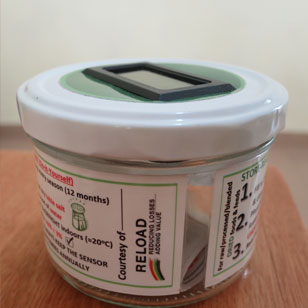Inventing low-cost technology that is affordable for small-scale grain farmers and traders
 Post-harvest losses of grains in Sub-Saharan Africa are estimated to be high: around 20% of the harvested grain is spoiled, and fungal contamination can include aflatoxins, which pose high health risks.
Post-harvest losses of grains in Sub-Saharan Africa are estimated to be high: around 20% of the harvested grain is spoiled, and fungal contamination can include aflatoxins, which pose high health risks.
One major factor affecting the storability of harvested grain is moisture content. Both under- and overdrying have negative implications for quality and food safety. For example, sun drying is a common practice in Sub-Saharan Africa on small farms as well as at various trading points. It requires plenty of open space and favourable weather, making even and adequate batch drying difficult to attain. When it is rainy or humid, the grains can be exposed to moisture for long periods, which favours infestation by moulds. In contrast, over-dried kernels can crack, allowing fungal spores and other contaminants to enter. However, technology for reliable moisture content detection is usually expensive and largely unavailable on small farms and trading points. RELOAD researcher Dr. Isaiah Muchilwa, a recent graduate of the Agricultural and Biosystems Engineering Department at the University of Kassel (Germany) and current lecturer at Moi University in Nairobi (Kenya), has invented a low-cost device called a MOOTLE. Such a device makes it possible for farmers and traders to closely monitor moisture levels before storing the grain or sending it further down the value chain. With this affordable technology, grain quality can be assessed earlier in the process, also by small-scale grain traders. Furthermore, by better regulating moisture content, smallholder farmers can improve their negotiating power in the market by demonstrating that they have higher quality grains. In 2015, this innovation was awarded the first prize in the UNIKAT ideas competition, an initiative of the Universiy of Kassel to support innovation and business development. Since then, production of these devices has started on a pilot basis. In February of 2018, Dr. Muchilwa distributed 500 MOOTLES among smallholder rice growers in Zanzibar (Tanzania) under the Competitive African Rice Initiative (CARI), a program commissioned by the German Ministry for Economic Cooperation and Development (BMZ) and co-financed by the Bill and Melinda Gates Foundation (BMGF). The principal aim of CARI is to create better linkages among rice value chain actors and as a result, increase the economic returns for all stakeholders (www.cari-project.org).






